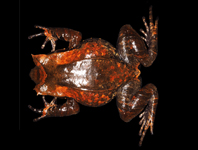Abstract
The genus Serpinema was erected from the genus Camallanus to include species parasitising freshwater turtles. Following this, the taxonomic status of Serpinema was challenged by different authors considering it as a subgenus or junior synonym of Camallanus. Several specimens of these nematodes were retrieved from the spot-legged wood turtle Rhinoclemmys punctularia from Cayenne, French Guiana. These specimens clearly differed from previously reported Serpinema and Camallanus species parasitising turtles by the number of caudal papillae, shape of spicules and development of vulvar lips. Based on morphological characters the nematodes were assigned to the genus Serpinema and described as a new species S. cayennensis n. sp. The description followed by the molecular data analyses based on 28S, 18S rDNA and cytochrome oxidase subunit 1 (COI) gene sequences.
References
Anderson, R. (1958) On the classification of the Filarioidea with special reference to the Filariidae and the Stephanofilariidae. Bulletin de la Societe Zoologique de France, 83 (1), 144–57.
Anderson, R.C. (2000) Order Spirurida-Suborder Camallanina, In: Nematode parasites of vertebrates 2nd ed. Their development and transmission. University of Guelph, Guelph, Ontario, pp. 349–356.
https://doi.org/10.1079/9780851994215.0349
Baker, M.R. (1983) Nematode parasites of the turtle Pelusios sinuatus, Pleurodira from southern Africa. Systematic Parasitology, 5, 161–167.
https://doi.org/10.1007/BF00009348
Baker, M.R. (1987) Synopsis of the Nematoda parasitic in amphibians and reptiles. Memorial University of Newfoundland, St. John’s, pp.114–117.
De Freitas, J.F.T. & Dobbin, Jr. J.E. (1971) Contribuição ao conhecimento da fauna helmintológica de quelȏnios no Estado de Pernumbuco, Brazil, Memórias do Instituto Oswaldo Cruz, 69 (1), 57–76.
https://doi.org/10.1590/S0074-02761971000100002
González, C.E. & Hamann, M.I. (2007) The first record of amphibians as paratenic hosts of Serpinema Larva (Nematoda; Camallanidae). Brazilian Journal of Biology, 67 (3), 1678–4375.
https://doi.org/10.1590/S1519-69842007000300026
Ivashkin, V.M., Sobolev, A.A. & Khromova, L.A. (1971) Essentials of Nematology. In: Skrjabin, K.I. (Ed.), Camallanata of animals and human and diseases caused by them. Vol. 22. Academy of Science of the USSR, Moscow, pp. 1– 388.
Kuzmin, Y., Tkach, V.V., Snyder, S.D. & Maier, M.D. (2009) Camallanus tuckeri n. sp. (Nematoda, Camallanidae) from Freshwater turtles (Pleurodira: Chelidae), in the Kimberley, Western Australia. Comparative Parasitology, 76 (2), 133–140.
https://doi.org/10.1654/4391.1
Kuzmin, Y., Tkach, V.V., Snyder, S.D. & Bell, J.A. (2011) Camallanus Railliet and Henry, 1915 (Nematoda, Camallanidae) from Australian fresh water turtles with descriptions of two new species and molecular differentiation of known taxa. Acta Parasitologica, 56 (2), 213–226.
https://doi.org/10.2478/s11686-011-0015-0
Mascarenhas, C.S. & Müller, G. (2017) Camallanus emydidius n. sp (Nematoda: Camallanidae) in Trachemys dorbigni (Duméril and Bibron, 1835) (Testudines: Emydidae) from Southern Brazil. Journal of Parasitology, 6 (2), 108–114.
https://doi.org/10.1016/j.ijppaw.2017.04.004
Moravec, F., Mendoza-Franco, E. & Vivas-Rodriguez, C. (1998) Fish as paratenic host of Serpinema trispinosum (Leidy, 1852) (Nematoda: Camallanidae). Journal of Parasitology, 84 (2), 454–456.
https://doi.org/10.2307/3284513
Moravec, F., Nie, P. & Wang, G. (2004) Redescription of Camallanus hypophthalmichthys Dogel and Akhmerov, 1959 (Nematoda: Camallanidae) and its first record from fishes in China. Journal of Parasitology, 90 (6), 1463–1467.
https://doi.org/10.1645/GE-3391
Moravec, F., Justine, J. & Rigby, M. (2006) Some new nematodes from marine perciform fishes off New Caledonia. Folia Parasitologica, 53, 223–239.
https://doi.org/10.14411/fp.2006.029
Noveli, I.A., Morton, G.F., Trindade, I.T., Neto-Silva, D.A. & Vieira, F.M. (2014) First occurrence of Spirocamallanus sp. (Nematoda, Camallanoida) in a freshwater turtle, Hydromedusa tectifera (Cope, 1869) (Testudines, Chelidae), from Brazil. Herpetology Notes, 7, 599–602.
Ribeiro, D.J. (1941) Pesquisas helmintológicas realisadas no Estado do Pará. VIII—Camallanus amazonicus n sp. parasite de Podocnemis expensa (SCHW). Memórias do Instituto Oswaldo Cruz, 35 (4), 723–732.
https://doi.org/10.1590/S0074-02761940000400002
Rigby, M.C., Adamson, M.L. & Deardorff, T.L. (1998) Camallanus carangis Olsen, 1954 (Nematoda: Camallanidae) report from(?)French Polynesia and Hawai’I with a redescription of the species. Journal of Parasitology, 84 (1), 158–162.
https://doi.org/10.2307/3284548
Rigby, M.C., Font, W.F. & Deardorff, T.L. (1997) Redescription of Camallanus cotti Fujita, 1927 (Nematoda: Camallanidae) from Hawai’i. Journal of Parasitology, 83 (6), 116–1164.
https://doi.org/10.2307/3284378
Rigby, M.C. & Rigby, E. (2013) Order Camallanida: Superfamilies Anguillicoloidea and Camallanoidea. In: Schmidt-Rhaesa, A (Ed.), Handbook of Zoology. Vol. 2. Gastrotricha, Cycloneuralia and Gnathifera. Nematoda. Deutsche Nationalbibliothek, Hamburg, pp. 1–369.
https://doi.org/10.1515/9783110274257.637
Rigby, M.C., Sharma, R.S.K., Hechinger, R.F., Platt, T.R. & Weaver, J.C. (2008) Two new species of Camallanus (Nematoda: Camallanidae) from fresh water turtles in Queensland, Australia. Journal of Parasitology, 94 (6), 1364–1370.
https://doi.org/10.1645/GE-1504.1
Sharma, R.S.K., Rigb, M.C., Sunmita, S., Sani, R.A., Vidyadaran, M.K., Jasni, S. & Dailey, M.D. (2002) Redescription of Serpinema octorugatum (Baylis, 1933) (Nematoda: Camallanidae) from Malayan box turtle Cuora amboinensis (Daudin) (Chelonia: Bataguridae). Systematic Parasitology, 53, 19–28.
https://doi.org/10.1023/A:1019997922052
Stormber, P.C. & Crites, J.L. (1974) Specialization, body volume and geographical distribution of Camallanidae (Nematoda). Systematic Biology, 23 (2), 189–201.
https://doi.org/10.1093/sysbio/23.2.189
Tkach, V., Kuzmin, Y. & Snyder, S. (2014) Molecular insight into systematics, host associations, life cycles and geographic distribution of the nematode family Rhabdiasidae. International Journal of Parasitology, 44 (5), 273–284.
https://doi.org/10.1016/j.ijpara.2013.12.005
Yeh, L.S. (1960) On reconstruction of genus Camallanus Railliet and Henry, 1915. Journal of Helminthology, 34 (1–2), 117–124.

